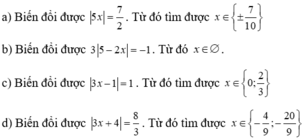Giải phương trình sau 3x+2+3x+4+3x+6+3x+8+.....+3x+100=2500
Hãy nhập câu hỏi của bạn vào đây, nếu là tài khoản VIP, bạn sẽ được ưu tiên trả lời.


Đáp số của bài toán đúng nhưng lời giải của bạn Hà chưa đầy đủ.
Lời giải của bạn Hà thiếu bước tìm điều kiện xác định và bước đối chiếu giá trị của x tìm được với điều kiện để kết luận nghiệm.
Trong bài toán trên thì điều kiện xác định của phương trình là:
x ≠ - 3/2 và x ≠ - 1/2
So sánh với điều kiện xác định thì giá trị x = - 4/7 thỏa mãn.
Vậy x = - 4/7 là nghiệm của phương trình.

1:
a: =>3x=6
=>x=2
b: =>4x=16
=>x=4
c: =>4x-6=9-x
=>5x=15
=>x=3
d: =>7x-12=x+6
=>6x=18
=>x=3
2:
a: =>2x<=-8
=>x<=-4
b: =>x+5<0
=>x<-5
c: =>2x>8
=>x>4

a: 7x+35=0
=>7x=-35
=>x=-5
b: \(\dfrac{8-x}{x-7}-8=\dfrac{1}{x-7}\)
=>8-x-8(x-7)=1
=>8-x-8x+56=1
=>-9x+64=1
=>-9x=-63
hay x=7(loại)
a, \(7x=-35\Leftrightarrow x=-5\)
b, đk : x khác 7
\(8-x-8x+56=1\Leftrightarrow-9x=-63\Leftrightarrow x=7\left(ktm\right)\)
vậy pt vô nghiệm
2, thiếu đề

1: \(\Leftrightarrow6\left(3x-1\right)+3\left(6x-2\right)=4\left(1-3x\right)\)
=>18x-6+18x-6=4-12x
=>36x-12=4-12x
=>48x=16
hay x=1/3
2: \(\Leftrightarrow\left(2x-1\right)\left(2x-1+x-3\right)=0\)
=>(2x-1)(3x-4)=0
=>x=1/2 hoặc x=4/3

a: 5-3x=6x+7
=>-3x-6x=7-5
=>-9x=2
=>\(x=-\dfrac{2}{9}\)
b: \(\dfrac{3x-2}{6}-5=3-\dfrac{2\left(x+7\right)}{4}\)
=>\(\dfrac{3x-2}{6}+\dfrac{x+7}{2}=8\)
=>\(\dfrac{3x-2+3\left(x+7\right)}{6}=8\)
=>3x-2+3x+14=48
=>6x+12=48
=>6x=36
=>\(x=\dfrac{36}{6}=6\)
c: \(\left(x-1\right)\left(5x+3\right)=\left(3x-8\right)\left(x-1\right)\)
=>\(\left(x-1\right)\left(5x+3\right)-\left(3x-8\right)\left(x-1\right)=0\)
=>(x-1)(5x+3-3x+8)=0
=>(x-1)(2x+11)=0
=>\(\left[{}\begin{matrix}x-1=0\\2x+11=0\end{matrix}\right.\Leftrightarrow\left[{}\begin{matrix}x=1\\x=-\dfrac{11}{2}\end{matrix}\right.\)
d: \(\left(2x-1\right)^2-\left(x+3\right)^2=0\)
=>\(\left(2x-1-x-3\right)\left(2x-1+x+3\right)=0\)
=>\(\left(x-4\right)\left(3x+2\right)=0\)
=>\(\left[{}\begin{matrix}x-4=0\\3x+2=0\end{matrix}\right.\Leftrightarrow\left[{}\begin{matrix}x=4\\x=-\dfrac{2}{3}\end{matrix}\right.\)

ĐKXĐ: \(-\dfrac{1}{3}\le x\le6\)
\(\left(\sqrt{3x+1}-4\right)+\left(1-\sqrt{6-x}\right)+\left(3x^2-14x-5\right)=0\)
\(\Leftrightarrow\dfrac{3\left(x-5\right)}{\sqrt{3x+1}+4}+\dfrac{x-5}{1+\sqrt{6-x}}+\left(x-5\right)\left(3x+1\right)=0\)
\(\Leftrightarrow\left(x-5\right)\left(\dfrac{3}{\sqrt{3x+1}+4}+\dfrac{1}{1+\sqrt{6-x}}+3x+1\right)=0\)
\(\Leftrightarrow x-5=0\) (do \(\dfrac{3}{\sqrt{3x+1}+4}+\dfrac{1}{1+\sqrt{6-x}}+3x+1>0;\forall x\))
\(\Rightarrow x=5\)
ĐKXĐ: \(\left\{{}\begin{matrix}3x+1>=0\\6-x>=0\end{matrix}\right.\)
=>\(\left\{{}\begin{matrix}x>=-\dfrac{1}{3}\\x< =6\end{matrix}\right.\)
\(\sqrt{3x+1}-\sqrt{6-x}+3x^2-14x-8=0\)
=>\(\sqrt{3x+1}-4+1-\sqrt{6-x}+3x^2-14x-5=0\)
=>\(\dfrac{3x+1-16}{\sqrt{3x+1}+4}+\dfrac{1-6+x}{1+\sqrt{6-x}}+3x^2-15x+x-5=0\)
=>\(\dfrac{3\cdot\left(x-5\right)}{\sqrt{3x+1}+4}+\dfrac{x-5}{\sqrt{6-x}+1}+\left(x-5\right)\left(3x+1\right)=0\)
=>\(\left(x-5\right)\left(\dfrac{3}{\sqrt{3x+1}+4}+\dfrac{1}{\sqrt{6-x}+1}+3x+1\right)=0\)
=>x-5=0
=>x=5(nhận)

\(a,2x\left(x-5\right)+4\left(x-5\right)=0\\ \Leftrightarrow\left(x-5\right)\left(2x+4\right)=0\\ \Leftrightarrow\left[{}\begin{matrix}x-5=0\\2x+4=0\end{matrix}\right.\\ \Leftrightarrow\left[{}\begin{matrix}x=5\\2x=-4\end{matrix}\right.\\ \Leftrightarrow\left[{}\begin{matrix}x=5\\x=-2\end{matrix}\right.\)
Vậy \(x\in\left\{5;-2\right\}\)
\(b,3x-15=2x\left(x-5\right)\\ \Leftrightarrow3\left(x-5\right)-2x\left(x-5\right)=0\\ \Leftrightarrow\left(x-5\right)\left(-2x+3\right)=0\\ \Leftrightarrow\left[{}\begin{matrix}x-5=0\\-2x+3=0\end{matrix}\right.\\ \Leftrightarrow\left[{}\begin{matrix}x=5\\2x=3\end{matrix}\right.\\ \Leftrightarrow\left[{}\begin{matrix}x=5\\x=\dfrac{3}{2}\end{matrix}\right.\)
Vậy \(x\in\left\{5;\dfrac{3}{2}\right\}\)
\(c,\left(2x+1\right)\left(3x-2\right)=\left(5x-8\right)\left(2x+1\right)\\ \Leftrightarrow\left(2x+1\right)\left(3x-2\right)-\left(5x-8\right)\left(2x+1\right)=0\\ \Leftrightarrow\left(2x+1\right)\left(3x-2-5x+8\right)=0\\ \Leftrightarrow\left(2x+1\right)\left(-2x+6\right)=0\\ \Leftrightarrow\left[{}\begin{matrix}2x+1=0\\-2x+6=0\end{matrix}\right.\\ \Leftrightarrow\left[{}\begin{matrix}2x=-1\\2x=6\end{matrix}\right.\\ \Leftrightarrow\left[{}\begin{matrix}x=-\dfrac{1}{2}\\x=3\end{matrix}\right.\)
Vậy \(x\in\left\{-\dfrac{1}{2};3\right\}\)
Câu d xem lại đề

\(\left(3x+2\right)\left(3x-2\right)-\left(3x-4\right)^2=28\)
\(\Leftrightarrow9x^2-4-\left(9x^2-24x+16\right)=28\)
\(\Leftrightarrow9x^2-4-9x^2+24x-16=28\)
\(\Leftrightarrow24x=48\)
\(\Leftrightarrow x=2\)
Vậy : \(x=2\)
\(\left(3x+2\right)\left(3x-2\right)-\left(3x-4\right)^2=28\)
\(\left(3x-2\right)^2-\left(3x-4\right)^2=28\)
\(\left(3x-2-3x+4\right)\left(3x-2+3x-4\right)=28\)
\(2.6x-6-28=0\)
\(12x-34=0\)
\(12x=34\)
\(x=\frac{17}{6}\)

bạn nên ghi rõ câu trả lời để mọi người hiểu